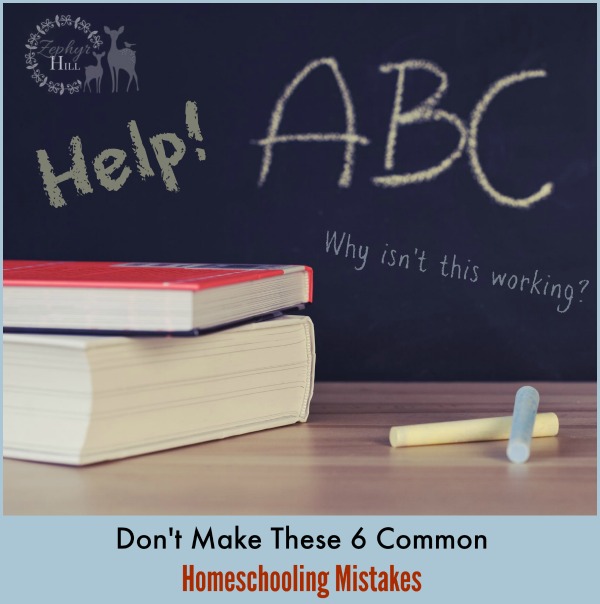
Every homeschooling family will make mistakes and have regrets along the way. Here are some of ours, and the changes we made.
#1 Doing it all yourself. After many years of homeschooling primarily on my own, it was a humbling experience to admit I couldn’t do everything myself. When I tried to, the results were sub-par. Ouch. Please get help if you need it! This comes in all sorts of forms:
- Hire a tutor for one or more subjects.
- Ask if another homeschooling family can help out. For instance, if math is a breeze for a friend and her teenage son, ask if YOUR son can do his lessons with them. Then think of a way you can help your friend out.
- Consider video lessons (there are free and paid options online). Get recommendations from a homeschool support group and check out online reviews.
- Ask your spouse for help. In many families, mama naturally does most of the teaching, but many fathers can and SHOULD be involved in some way. Even if it’s just one class they are responsible for, it’s one less thing on your shoulders. Plus, it teaches children that both parents are invested in homeschooling, and will back each other up.
- Ask a sibling for help. My teenagers can help their younger siblings with some subjects when I’m very busy. Catherine even likes making little worksheets for her little sister and brother. Even a younger child can some of the load off of you. Eight-year-old Samuel can easily drill Kindergartener Susanna on her alphabet and math flash cards.

#2 Thinking a new book will solve everything. “If we just had a different curriculum…..” It’s tempting but if you don’t get to the root of the problem, you’ll just be running away from it. Things we often mistake as “curriculum problems” are:
- Bad attitude / lack of discipline. It’s quite possible that the problem isn’t your curriculum; it’s you and your child! No new book will magically fix a discipline problem, or banish common issues like apathy and laziness. Before switching programs, always ask yourself, is this a behavioral issue? If you have to tell your child three times to make up his bed, or argue/yell to get things done, then it’s not a shocker that trouble will arise during home learning. More tips on dealing with bad attitude here!
- Lack of interest. Catherine has little aptitude or interest in math. Over the years, we tried 3 different programs before realizing we couldn’t blame it on the math programs anymore! She’s never going to like math, and may not advance that far in it. So we just picked a reliable program and let her work through it at her own pace. We can get occasional tutoring as a backup, if needed.
- Improper grade level placement. Not all children are going to be on the same grade level in every single subject, and that’s why homeschooling is so great. You can customize their learning. It’s ok if your child is doing everything at 5th grade level except for math. Don’t push him into the next book or you will regret it later. Every once in a while we will take 2 years to finish a book. That’s ok. They will know the material thoroughly, and at traditional schools they rarely ever finish books anyway!
#3 Planning too much. I am the world’s worst about this! It’s so satisfying to make plans at the beginning of the year. My head is full of all the fun and interesting things we’ll do in the new school year. Not to mention that we will finish every book and every project, and dot every I and T! But you realize as the year commences that you have to be realistic and deal with what comes. When someone needs extra help, you slow down and re-group. When someone moves ahead faster than expected, you have to scramble to provide new material. Maybe you just find that there’s not much time for a lot of field trips (bummer).
Yes, you should make plans! But be prepared to tweak them, as needed, and you won’t be disappointed when something has to change.
#4 Neglecting your school room. We’ve all read about how you need to be organized for a successful homeschool, and of course that’s true. No one wants to work in a cluttered, messy space, and it’s frustrating when things are constantly getting lost or destroyed.
A lot of homeschoolers do their work on the dining room or kitchen table. The drawback is that these spaces are trashed and pretty much unusable most of the day. If you can, carve out a place somewhere else in the house for learning.
Try going a step further. Create a space you’ll actually LIKE to work in. If that means spending $20 to paint your school room a fresh, appealing color, do it. Maybe it means sacrificing a non-essential room (like a toy room or “movie” room) to turn it into a real school room. This reinforces just how committed you are to home learning.
Keep a vase of pretty flowers on your school table. Buy yourself a beautiful monthly planner and a set of colored pens to go with it. Hang something beautiful, fun or educational on the walls. Put up a bulletin board that everyone can help decorate according to the seasons. Whatever makes the teacher and students happy!

#5 Being a taskmaster. Don’t become obsessed with simply getting things done so you can check them off a list. That’s not always the best measure of success. Let’s say your second grader is struggling to read. If that’s the case, maybe you shouldn’t insist on a weekly spelling test, even though it’s part of your curriculum. It might be too overwhelming and lead to tears and burnout. You’ll have a happier and more productive child if you simply focus on the reading. And he will naturally move onto spelling mastery after that. Note: Remember this if enrolling your child in a program; make sure it allows for flexibility!
Nothing should be mandatory when it comes to homeschooling. Tailor the learning to your child’s skill level and be willing to remove a task from your list if he’s not ready for it.
#6 Forgetting to take breaks. A common complaint of both parents and teachers in traditional schools is that recess and lunchtime keep getting shorter. Children and educators both need time to relax and recharge their batteries, so don’t try to squeeze everything into the morning hours just so you can take the afternoon off. Burnout invariably follows this intense approach.
Over the years, I’ve found that school in the morning (most challenging subjects first), with a break for lunch and recess, plus a little more school in the afternoon, works really well.

Do you have any homeschooling tips to share? Any mistakes that you made along the way?

This is an awesome resource for anyone thinking about homeschooling. I knew a lot went into it, but I didn’t know how much. I also didn’t know that you didn’t have to do it alone.
I think homeschooling is a great thing! Like your said, children are not always at the same grade level for all subjects and with homeschooling you have the flexibility to adjust the curriculum.
When I tried to home school my daughter I feel like my patience went poof!! I think it was because I was trying to cover too much, too fast.
I have been homeschooling for 10 years, I so can relate! This is why we belong to a large homeschool group. It takes a village to raise a child and some moms offer gifts I am not good at and vise versa.
Anyone can choose to homeschool it also depends on what the kids want. My husband, I and my daughter herself decided to send her in school as she wanted to meet other people aside from us.
I agree it’s important to listen to feedback from your children regarding educational choices, although the ultimate decision rests with the parents. When I was a teen, my mother and father actually began homeschooling us because we were being bullied terribly at our school, and we let them know about the problem. ~Anne Marie
I’ve never homeschooled, but I’m sure you have you to plan and pace yourself to avoid getting overwhelmed!
Great tips for home schooling moms. It can sometimes be overwhelming and these tips hep you stay organized and focused on what is most important.
I’m sharing this post with all my homeschooling friends. These mistakes even apply to other things we do at home – forgetting to take breaks and not asking for help! I see myself in so many of these mistakes.